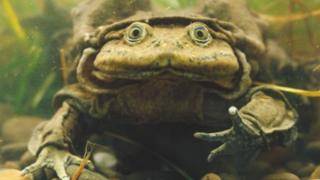Zhukov
VIP Member
What were seeing here is completely unprecedented declines and extinctions, said Simon N. Stuart of the World Conservation Union, lead researcher on the study.
Unprecedented? An interesting, if overly exaggerated, exclamation considering our historical presence's time frame is dwarfed by the time frame associated with the existence of amphibians.
These declines are outside our normal experience, Stuart said in a telephone interview.
Indeed.
Amphibians have porous skins and narrow environmental requirements, and their decline may be an indication that something sinister is under way in the environment, Simon said.
Well considering percentage-wise, the ascendancy of humanity represents the greatest extinction level event the globe has ever known it does not surprise me that narrow niche species and species incapable of rapid adaptation will die out first.


